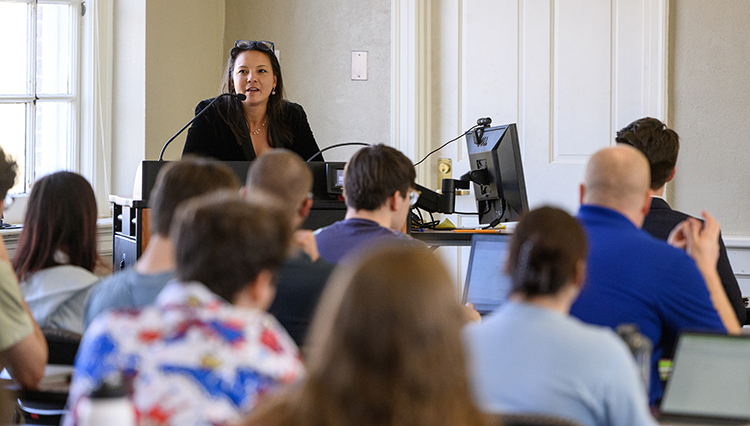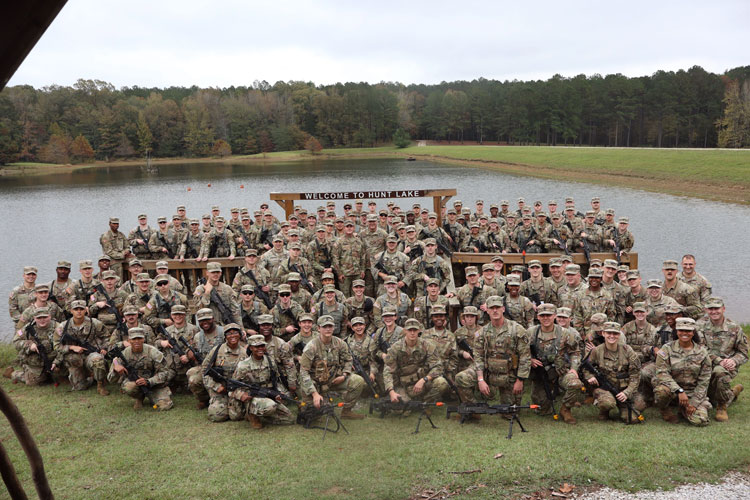
Shaio Zerba, director of the Center for Intelligence and Security Studies at the University of Mississippi, speaks to students during one of the center's exercises. Several students from the program have contributed research to the National Geospatial-Intelligence Agency's Tearline Project, giving them real-world experience with the intelligence community. Photo by Thomas Graning/Ole Miss Digital Imaging Services
Center for Intelligence and Security Studies Students Publish Intelligence on Montenegro Debt Traps
Five University of Mississippi students contributed research to the National Geospatial-Intelligence Agency’s Tearline Project, an open-source intelligence platform created to expand analytic outreach with outside groups and encourage in-depth understanding of various topics for the intelligence community.
The students’ project studied what could happen if Montenegro were to default on the Montenegrin-Chinese Belt Road and Initiative loan agreement. In 2014, China agreed to help fund a highway between Montenegro and Serbia to boost economic growth.
A condition in the agreement stipulated that a default on the loan would result in Chinese ownership of Montenegrin assets as repayment.
“It was an exciting way for students to interact with the intelligence community and practice the analytical tradecraft they learned in the center’s intelligence and national security courses,” said Shaio Zerba, director of the university’s Center for Intelligence and Security Studies.
“When they go to interview with an agency, they can point to this as an example of their research that actually met the rigors of the intelligence community.”
The project concluded that, while a Montenegrin default is unlikely, the result of such a lapse would include China potentially gaining ports, railroads and other infrastructure in the Balkan country.
Sydney Lynch, an Ole Miss junior art history and classics major from Long Island, New York, was a team leader for the project. She said working with the NGA gave her experience in creating high-level intelligence reports while using what she learned in the intelligence and security studies minor.
“The foundation that the CISS provides gave me a lot of applicable skills,” Lynch said. “All of the projects that we have in our classes are producing real intelligence reports. While it was theoretical, the methods and techniques taught in the class were really important in writing this report.”
The five researchers are members of the Center for Open Source Analysis, a student-led group producing open-source intelligence on issues of national security. When members of COSA approached the NGA, the lead agency on geospatial intelligence, last fall about partnering on an upcoming report, the intelligence agency recommended the Montenegrin debt trap dilemma, said Kevin Riehle, instructional associate professor in intelligence and security studies and faculty adviser to COSA.
“This is an area where the NGA doesn’t have a lot of manpower assigned,” he said. “The students really filled in a gap that NGA had.”
The intelligence agency provided aerial photographs of Montenegrin infrastructure such as ports, mines and railroads. This allowed students to determine the potential value those facilities would have for China, Riehle said.
The students’ research could be valuable to members of the intelligence community focusing on the Balkan region or those who are tracking China’s investments, among other uses, Riehle said.
“One of the missions of the Center for Intelligence and Security Studies is to give students a good understanding of how the intelligence community works,” he said. “Research like this – using real imagery, looking at a question that is of validity to the intelligence community – gives students real-world experience.
“This isn’t just theoretical; this is students doing real work for the intelligence community.”
By Clara Turnage





